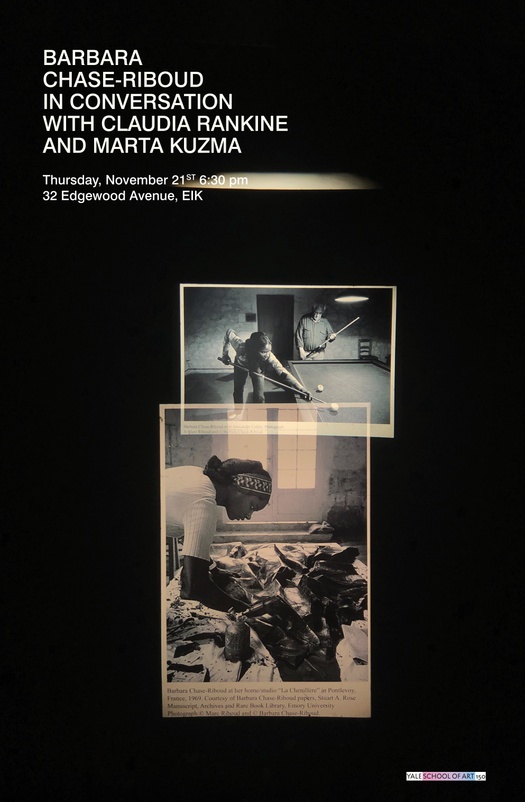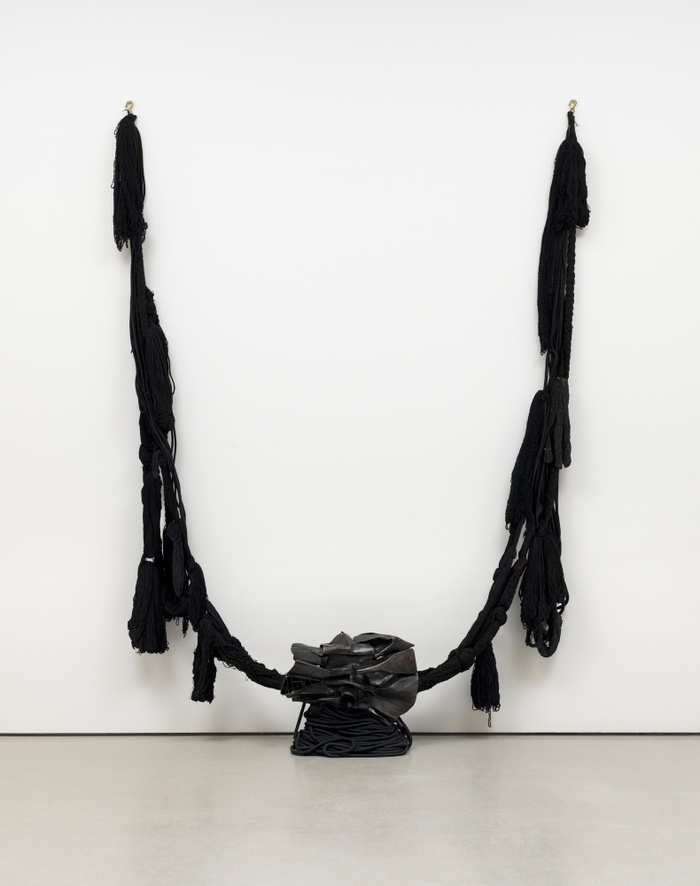Editor details
Last edited by: Lindsey Mancini
Edit access: Everybody
Hosted in conjunction with the series of public events organized by the Yale School of Art in celebration of its 150th anniversary and its status as a co-educational professional school of art, acclaimed artist and poet Barbara Chase-Riboud will speak as the anniversary year’s Honorary Lecturer with Yale University’s Professor of Poetry Claudia Rankine and Stavros Niarchos Foundation Dean and Professor of Art Marta Kuzma in a public conversation on the evening of Thursday, November 21st.
In 1960, Chase-Riboud became the first known African-American woman to receive an MFA from what was then the Yale School of Architecture and Design. Her return to New Haven marks a significant historical moment for the Yale School of Art. It took nearly a century—ninety-one years since the School’s opening—for the first known woman of color to be acknowledged as an artist in the way white women of privilege had enjoyed since 1869. Likewise, the School of Art was limited to male leadership until just three years ago, when Marta Kuzma was appointed the first woman dean in the School’s history in 2016. In an unflinching conversation, Chase-Riboud, Rankine, and Kuzma will discuss the overwhelming roles that race and gender have played—and continue to play—in spaces of institutional power such as Yale, and the ways in which Chase-Riboud’s practice has informed, and in many ways led, the development of abstraction in the twentieth and twenty-first centuries. It will also pursue Chase-Riboud’s life as part of the African diaspora in Paris in the 1960s.
During her time at the School and in the nearly six decades since, Chase-Riboud has developed a profound and nuanced artistic practice that reaches from sculpture and drawing to poetry and nonfiction, engaging with enlightened understandings of history, identity, and a sense of place. Her celebrated work operates on several dichotomies that have become central to her practice: hard/soft, male/female, flat/three-dimensional, Western/non-Western, stable/fluid, figurative/abstract, powerful/delicate, brutal/beautiful, violence/harmony. In 1958, she developed her own particular innovation on the historical direct lost-wax method of casting bronze sculpture. Creating thin sheets of wax that she could bend, fold, meld, or sever, Chase-Riboud invented singular, extremely intricate models that she would then entrust to local foundries for direct bronze casting without an intermediate plaster cast. This new approach to a centuries-old process enabled her to produce large-scale sculptures comprised of ribbons of bronze and aluminum. In 1967, she added fiber to these metal elements, devising the seemingly paradoxical works for which she is most renowned—sculptures of cast metal resting on supports hidden by cascading skeins of silk or wool so that the fibers appear to support the metal.
Before attending Yale, Chase-Riboud had already had work collected by the Museum of Modern Art in New York, won a John Hay Whitney Fellowship to study at the American Academy in Rome, and travelled to Egypt—an experience which would profoundly influence her mature work. Because the Yale School of Architecture was not designated as its own professional school until 1972, Chase-Riboud attended what is now the Yale School of Art as it was undergoing a dramatic shift toward design in the mid-twentieth century, soon after Josef Albers joined the faculty in 1950 and infused the School’s MFA program with interdisciplinary Bauhaus concepts. During her time as a graduate student, Chase-Riboud studied with Albers, Phillip Johnson, Paul Rand, Alvin Eisenman, Louis Kahn, Vincent Scully, and Henri Peyre among others.
Chase-Riboud established a studio in Paris in the 1960s, and in Rome in the 1980s. In 1965, Chase-Riboud traveled to the People’s Republic of China with her first husband, French photographer Marc Eugène Riboud, as the first American woman invited to visit the country since its political revolution. Although known for her achievements in sculpture and drawing, Chase-Riboud is equally renowned for her literary success. In 1974, she published her first book of poetry, From Memphis & Peking, edited by Toni Morrison and published by Random House, to critical acclaim. Five years later, with the encouragement of Jacqueline Kennedy Onassis, she published her first novel, Sally Hemings (Viking Press, 1979), which won the Janet Heidinger Kafka Prize in Fiction by an American Woman. The book, about the relationship between Thomas Jefferson and his enslaved mistress Sally Hemings, became an international bestseller and would later be translated into ten languages with three million copies in print. Its sequel, The President’s Daughter, was published by Crown Publishers in 1994. In 1998 she was awarded the Carl Sandburg Poetry Prize as Best American Poet for her poetry collection Portrait of a Nude Woman as Cleopatra.
Chase-Riboud has been the recipient of numerous awards and honorary degrees, including a Doctorate of Fine Arts from Temple University (1981), a Doctorate of Letters from Muhlenberg College (1993), the James Van Der Zee Award (now known as the Brandywine Lifetime Achievement Award) from the Brandywine Workshop (1995), a Doctorate of Letters from the University of Connecticut (1996), the Women’s Caucus for Art Lifetime Achievement Award from the College Art Association (2007), the Alain Locke International Award from the Detroit Institute of Arts (2007), and the Tannie Award in the Visual Arts in Paris (2013). In 1996, she was knighted by the French government as Chevalier de l’Ordre des Arts et des Lettres. Her work has been exhibited at numerous institutions worldwide, and can be found in the permanent collections of major museums including the Museum of Modern Art—where she became the youngest artist ever collected by their permanent collection (William Lieberman, Department of Drawings and Prints)—the Berkeley Art Museum, the Metropolitan Museum of Art in New York, the Ministry of Culture in France as well as the National Collections of France, the New Orleans Museum of Art in New Orleans, the Philadelphia Museum of Art in Pennsylvania, and the Smithsonian African American Museum in Washington D.C., among many others.
Chase-Riboud recently signed with United Talent Agency’s Fine Arts and Literary divisions for a nine-book, three-exposition contract. The first publication will be an anniversary edition of the two-volume Sally Hemings series, represented by Harper Collins’ Amistad Press. Following publications include Chase-Riboud’s historical novel The Great Mrs. Elias and a memoir entitled I Always Knew, comprised of her newly collected letters. This, in addition to six new collections of poetry—the first since Every Time a Knot is Undone, A God is Released was published in 2014.
Claudia Rankine is the Frederick Iseman Professor of Poetry at Yale University in the departments of African American Studies and English. She is author of five collections of poetry including Citizen: An American Lyric and Don’t Let Me Be Lonely; two plays including Provenance of Beauty: A South Bronx Travelogue; numerous video collaborations, and is the editor of several anthologies including The Racial Imaginary: Writers on Race in the Life of the Mind. Rankine was awarded the prestigious MacArthur Fellowship “genius” award in 2016, and she won a distinguished Guggenheim Fellowship in 2017. For her book Citizen: An American Lyric, Rankine won both the PEN Open Book Award and the PEN Literary Award, the NAACP Award, and the National Book Critics Circle Award for Poetry—Citizen was the first book ever to be named a finalist in both the poetry and criticism categories—and was a finalist for the National Book Award. Citizen also holds the distinction of being the only poetry book to be a New York Times bestseller in the nonfiction category. Among her numerous awards and honors, Rankine is the recipient of the Poets & Writers’ Jackson Poetry Prize and fellowships from the Lannan Foundation and the National Endowment of the Arts.
The Yale School of Art is proud to present this historic dialogue between its first woman dean, its first known African-American woman graduate, and an acclaimed poet, essayist and scholar at Yale who can speak to the social and cultural criticisms Chase-Riboud addresses through her work. This event is hosted in cooperation with both the Department of African-American Studies at Yale and the Yale School of Architecture.
Editor details
Last edited by: Lindsey Mancini
Edit access: Everybody
Editor details
Last edited by: Lindsey Mancini
Edit access: Everybody
Editor details
Last edited by: Lindsey Mancini
Edit access: Everybody



